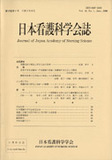Japanese
English
- 販売していません
- Abstract 文献概要
- 参考文献 Reference
- サイト内被引用 Cited by
要旨
糖尿病患者の教育についてより効果的なアプローチを検討するため,教育入院直後から調査時点までの空腹時血糖値の変動と患者の生活様式の変容との関連性を調べ,その変容を促した要因について分析した.
研究は2段階で行った.
第1段階での調査対象者は,昭和62年9月から11月までの間に,T病院糖尿病専門外来を受診した108名のⅡ型糖尿病患者である.空腹時血糖値を診療録から得,また,患者の生活様式については質問紙調査を行った.個々の空腹時血糖値の変動は教育入院の退院直後半年間と,調査時点より前の半年間の各々の空腹時血糖値の平均値の差とした.
2次調査は,1次調査対象者の中から16例を選出し患者に面接した.同時にその家族に対し郵送法による質問紙調査を行った.
その結果,1次調査並びに2次調査を通して以下の知見が得られた.(1)空腹時血糖値の変動は,糖尿病と診断されてからの年数,治療法,食事量及び周囲の人と一緒に食事をする頻度と関連がある.(2)患者の食事量や周囲の人との食事のとり方は,疾患を自分の問題として捉える,主体的な健康観の有無,食事制限のストレス解消方法,教育入院での学び方に影響されていた.(3)家族からの支援がある時,つまり家族に糖尿病への理解や知識があり,患者と家族が共に協力している時には患者も糖尿病に良く対処できていた.
Abstract
The purpose of this study is to develop a way to educate diabetics more effectivery. In order to know how the changes in their life-styles affected the changes in FBS, we examined relationships between the changes in FBS of diabetics and the changes in their life-styles, and analyzed the affecting factors.
This study was conducted in the two steps.
In the first step 108 Type II diabetics were selected as subjects. All of those diabetics had consulted at the special outpatient section at T hospital from Sep. to Nov.'87. We collected the data of individual FBS from their chart and surveyed each patient's life-style via questionnaire. Individual FBS changes were caluculated by subtracting the FBS of those attending T hospital from the FBS at the time of their previous admission where they received diabetic education.
In the second step 16 were selected out of the subjects in the first step. We interviewed them and sent their families questionnaire by mail.
The results through the first and second steps are as follows:
(1) The change amount of FBS correlated closely with the patients' length of time since diagnosis, treatment, dietary volume and the frequencies of eating out. (2) Patients' dietary volume and frequency of eating out were affected by their ability to recognize DM as their own problems, the existence of their own health philosophy, their coping mechanism as it relates to their diet, and the learning during their educational admission. (3) Especially they were affected largely by the family support. When a patient's family understood and knew the DM treatment properly and co-operated with each other, the patient was found to cope with DM well.
Copyright © 1990, Japan Academy of Nursing Science. All rights reserved.


